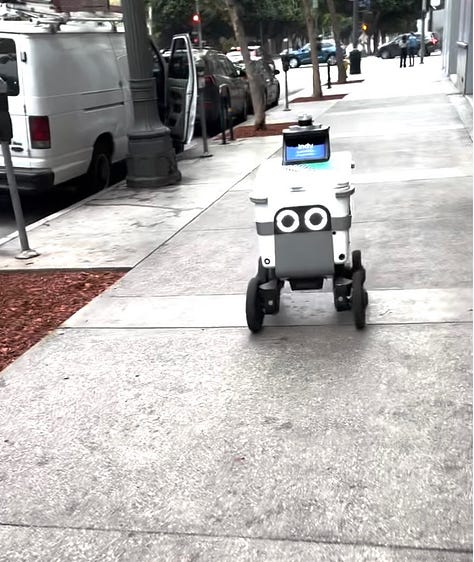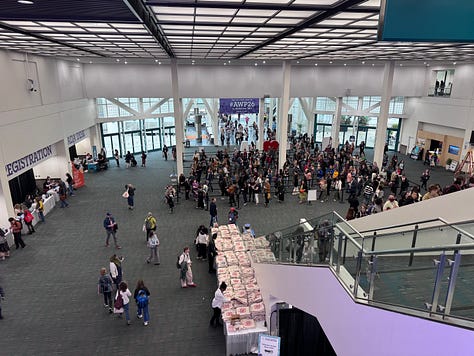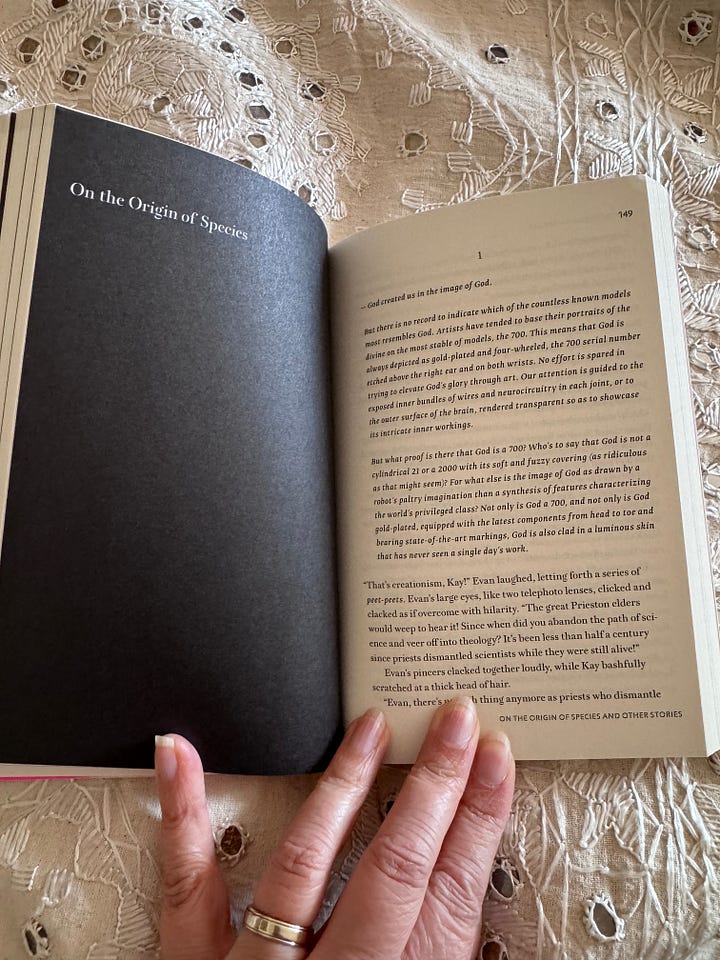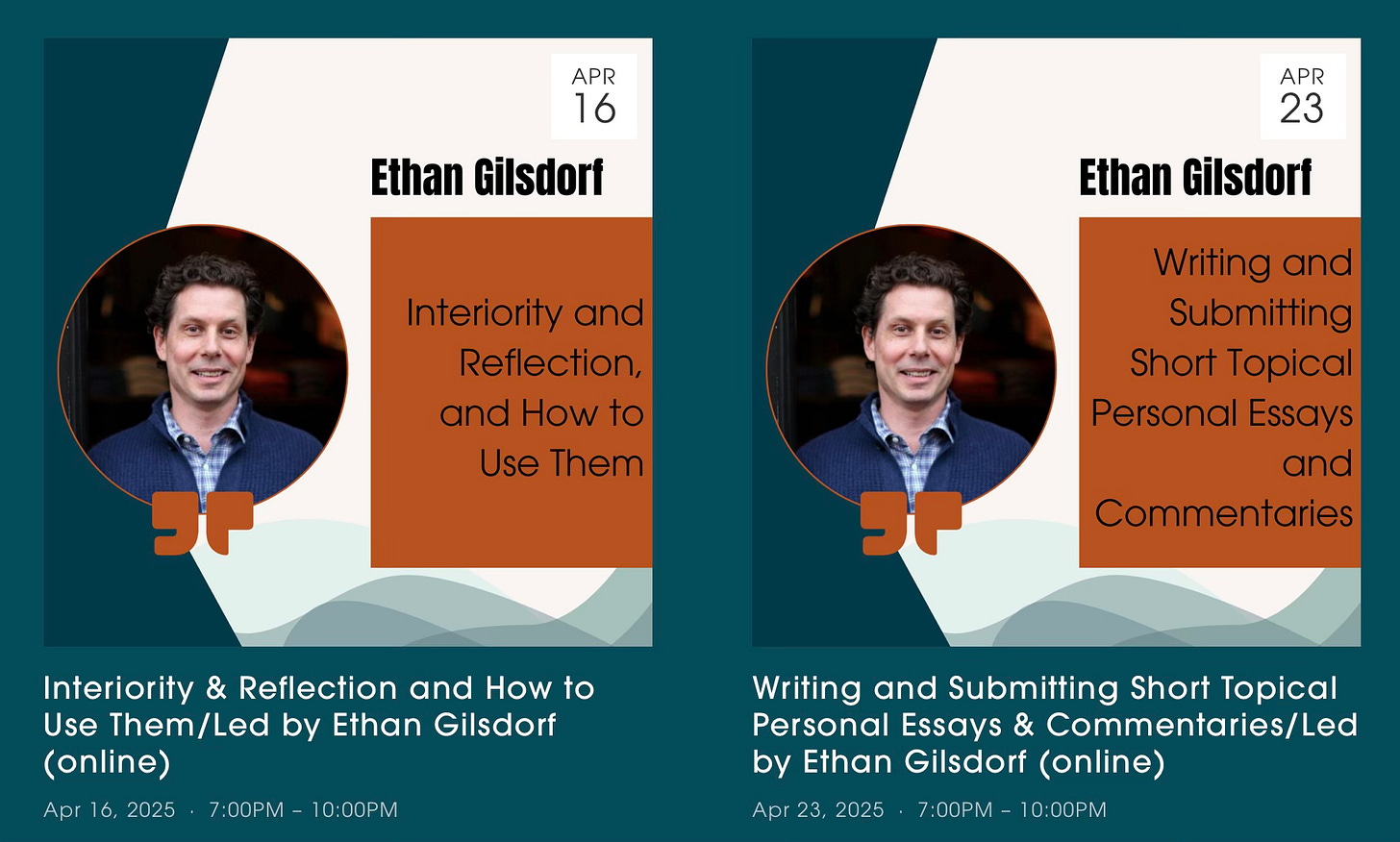10,000 writers walk into a room
Practical and soul-reviving resources for all you readers and writers
Every year, over 10,000 writers and other professionals from the publishing world gather at what we all know as AWP, the conference put on by the Association for Writers and Writing Programs. This year it took place, a couple of weeks ago, in Los Angeles, at the convention center. DTLA was crawling with lanyard-wearing, tote-bag carrying creative types. (It was also crawling with creepy robot delivery carts that rolled down the sidewalk with names like Monty and Indy and stared us down with circular lights for eyes, daring us to get in their way, as well as with driverless cars with weird whirring gizmos on their roof, and steering wheels that turned as if by the hand of a ghost.)



With close to 300 panels, a massive exhibit hall, a gazillion off-site events and parties and readings, I'll admit that I was a bit apprehensive. Would this be a good use of Galiot time and resources? Would I be overwhelmed by the sheer size of the event? Would I encounter travel woes with our increasingly beleaguered airline industry? No. Quite the contrary.
I attended the conference mostly with my Galiot hat on, and my writer one available (in my tote bag) to plop onto my head as necessary. I want to share with you the magic of this gathering and how necessary and heartening and useful it was. How it was a chance to be in community with thousands of people practicing empathy and resistance and creativity and yes, I'm going to be woo-woo and say it: kindness. I ran into old friends and made new ones, had delightful chance encounters, and really good conversations I'd scheduled ahead of time. I came away exhausted but energized, and with lots of ideas for Galiot.
I'm going to share some resources that may be valuable to you all, right after I put in a plug for some upcoming online classes by Ethan Gilsdorf on interiority & reflection (April 16), and on personal essays & commentary (April 23). Ethan is a fantastic and engaging instructor with years of experience, so don't miss out!
We are also running a special on Cathy Elcik's incredibly insightful and practical Project Planning for Writers on Saturday, April 26th. Just $30 for 90 minutes with a wonderful writer who is a pro at planning projects and helping other writers. You need this for that project you've been meaning to start, or have stalled on. Or that one you're jazzed to have begun.
Reading: Important memoirs
I spoke on a panel of writers on the rather niche topic of "non-linear" structures in BIPOC memoirs. I don't write memoir, but Galiot is interested in this kind of work. The panel was at 9 am the first full day of the conference, which caused us some worry. Who would show up to our session when we were competing with over 20 others at the same time, including ones with Alexander Chee and the Simon and Schuster editor phenom, Yahdon Israel? And then we walked into the massive room set up for at least 300 attendees and we had to laugh. But you know what? We had a good 50 people in the session, and it was fantastic. The audience was engaged, nodding, asking lots of questions, and they crowded to our table at the end. The readings by my fellow panelists were moving and a good reminder of the variety of lives and experiences taking place all around us:
Theresa Okokon’s newly published memoir, Who I Always Was, is a memoir in essays about her experience growing up as a Black woman in suburban Wisconsin in the shadow of the disappearance of her Nigerian father.
Lorena Hernández Leonard’s memoir in progress, Salsipuedes: Leave If You Can, recounts her growing up in Colombia during the peak of the drug wars.
Artress Bethany White’s memoir in poems, A Black Doe in the Anthropocene, follows her ancestors' enslavement in 1700s Virginia and North Carolina, weaving together data from Hairston family plantation archives and her Black Hairston mother's inherited oral slave narrative to create searing poems on a history of Scottish genes and African ancestry. (This book will be out in June 2025.)
Anri Wheeler read from an essay on watching the movie Turning Red with her young daughters as a mixed race woman who grew up never seeing herself in books or film.
And I'm going to add in Neema Avashia, who spoke at a session I attended, and whose memoir, Another Appalachia: Coming Up Queer and Indian in a Mountain Place, sounds riveting. Plus she spoke very positively of her experience with a small press, so that immediately adds to her appeal in my eyes!

Author-parent community
I ran into M.M. De Voe, the dynamo who runs the literary community Pen Parentis for author parents. With a literary salon, accountability meetups, a writing fellowship, and lots of other resources for writers balancing their craft with parenthood, Pen Parentis is a wonderful, New York-based organization. I had the joy of presenting at one of their gatherings many years ago. Pen Parentis has been around for more than ten years, and I recommend you check it out if you are juggling parenting with writing. You don't need to be based in NY to join.
Small presses
What a wonderful, collaborative, friendly vibe among all the small presses I spoke with! In particular, I urge you to check out the books put out by Kaya Press, a publisher of bold and provocative works by the Asian Diaspora. Look at these two beauties I purchased! And I had a great editor-to-editor chat with Austin Nguyen who very generously offered to help as a sounding board and general resource. I also got to stop by the booth of Anne Trubek who founded Belt Publishing for works originating in the Rust Belt of America, and who has a very informative Substack called Notes From a Small Press.




Literary magazines
There were so many with booths! I swung by the Pangyrus one, and while I was chatting with founding editor Greg Harris a poet came by to thank the magazine for publishing his work, and it turns out he'd come from my town all the way in the Boston area (and was on my flight home). I told him about the Arlington Author Salon I run with a friend, and our 10 year anniversary celebration (last night) with a trio of poets. If you're looking for a home for your short fiction, non-fiction, or poetry, I recommend you submit to Pangyrus, or to Solstice, which didn't have a booth this year but did just publish an interview with Henriette and me. You know, in case you want to hear more from us. If you're BIPOC in particular and have work to submit, then definitely check out Kinsman Quarterly. Everyone should take a peek at this beautiful magazine. I met the founder, Monique Franz, almost immediately on arrival, and we hit it off like a house on fire. What a dynamic, fun, problem-solving, fabulous woman. (Also she lived 12 years in Hong Kong where she started a group for Black women in the city, a group which now counts 700 members!)

Organization
I want to put in a plug for the Community of Literary Magazines and Presses, or CLMP, for really doing extraordinary work on behalf of lit mags and small presses: connecting us to resources, offering discounts on services ranging from book printing to funding sources, running informational webinars, and keeping the conversation going among its members. They have a very small staff, considering all they do. If you publish a lit mag, books, zines, chapbooks, or digital books, definitely become a member. Plus they threw a really fun party, sponsored by the Whiting Foundation, at AWP.
Festival
Monique and I immediately picked up Carla Du Pree, who exuded class and sass. She's the founder of Baltimore's CityLit Project, that runs a number of events throughout the year, including an annual literary festival. Next year's AWP conference will be in Baltimore, too, so I can't wait to reconnect with her there, and perhaps even participate in the CityLit festival.
State of the non-profit literary scene
Things took a sobering turn at a session hosted by LitNet, a coalition of literary organizations from across the US that works to promote the importance of the literary arts in American culture, build the capacity of the literary field, and broaden funding for the literary arts. (Yes, I did just copy that from their site.) In attendance were leaders from major organizations such as Poets and Writers, PEN America, the Author's Guild, Grub Street, and many others. Most of the meeting focused on what our current administration is doing to funding for the arts, and how to survive the next few years. We talked about when to speak up and when it might be safest to be quiet, who can best afford to be loud and who needs to be protected, the role of writers and our words, and best practices for shielding ourselves, our organizations, and our communities from harm. We spoke of lobbying, of speaking to our elected officials, of increasing our literary citizenship. The conversation reminded me of the importance of what we do, of how imperative it is we make sure the most vulnerable and at-risk among us are both protected and that their stories get out, and of how glad I am that from the get-go Henriette and I decided not to be a non-profit, not to rely on grants, and to be dependent on as few middle-people as possible.
Ok, have fun following all those links. And also, let us tempt you to join us in Greece this July for a 5-day workshop among the hills where you will eat amazingly, bask in nature, workshop your writing project, learn from craft sessions, and have time to write or attend office hours. We realize travel and expenses may seem daunting right now, but we promise an unforgettable experience. And we hope to be able to offer a scholarship in the future.






Baltimore is closer to my neck of the woods. Really looking forward to attending next year. Thanks for this round up! I’ll check out the links!
Many thanks for this post! I missed AWP but I need to go next year!